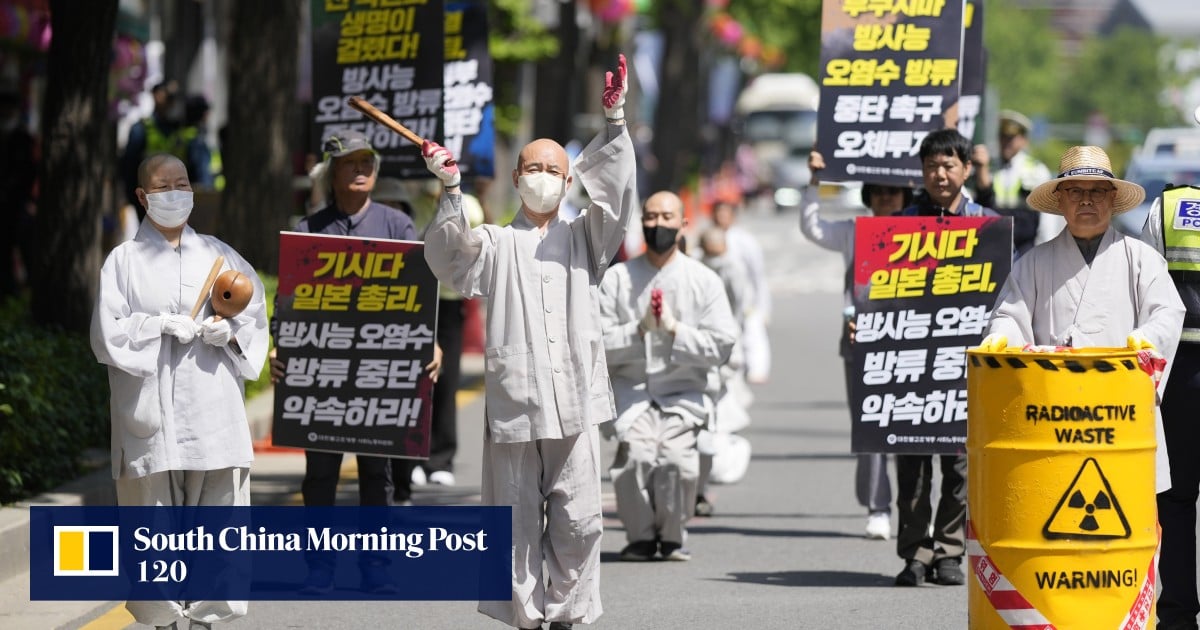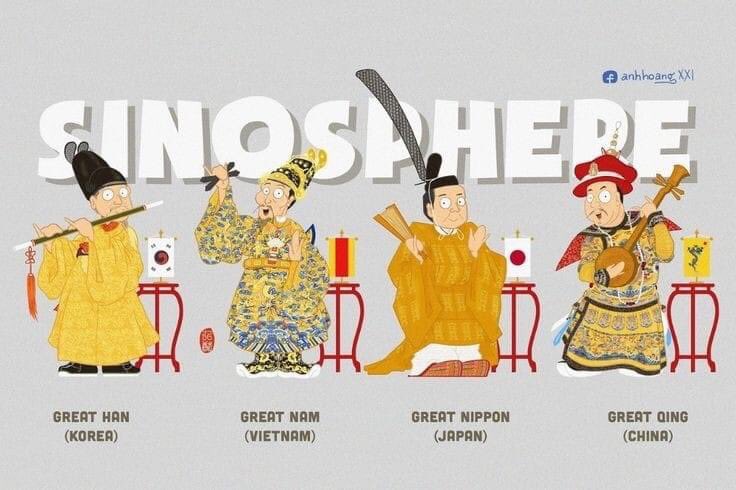beijingwalker
ELITE MEMBER

- Joined
- Nov 4, 2011
- Messages
- 65,191
- Reaction score
- -55
- Country
- Location
‘Drink it if it’s safe’: South Korean lawmaker challenges Japan officials to consume treated Fukushima water
- Opposition leader Lee Jae-myung wants South Korea to reconsider sending experts to inspect the plant, which some say could help justify release plans
- South Korea’s ruling party has accused the opposition of stirring up anti-Japanese sentiment with ‘unscientific’ and ‘senseless’ claims
Park Chan-kyongPublished: 12:00pm, 16 May, 2023

Tanks storing treated radioactive water at the Fukushima Daiichi nuclear power plant in Japan. Photo: AP
South Korea’s top opposition leader Lee Jae-myung has challenged Japanese officials to make good on their safety assertions by drinking treated radioactive water that is scheduled to be released from the crippled Fukushima nuclear power plant into the ocean.
Lee made the remarks as a team of South Korean experts plan to visit the Fukushima plant to hopefully evaluate the safety of the treated water, sparking allegations that the trip could wind up being used to build up justification for its release.
When President Yoon Suk-yeol and Japanese Prime Minister Fumio Kishida met in Seoul earlier this month for their second summit in less than two months, the leaders agreed to allow a group of South Korean experts to visit Japan next Tuesday and Wednesday to inspect the planned release of radioactive water.
Yoon has made it a top priority to mend relations with neighbour and former colonial master Japan, even if it means a unilateral concession on the highly sensitive issue of compensating the Korean victims of Japan’s wartime forced labour.
South Korea has suggested a Seoul-based fund pay reparations to Korean victims to resolve an issue that has rekindled animosities over Japan’s 1910-45 occupation of the peninsula, sparking outrage among some victims and critics.
“Japan is putting forward claims that the contaminated water from the Fukushima nuclear power plant, if treated, is safe enough to drink,” Lee said on Monday. “If it is safe enough to drink, they should use it as drinking water.”
It should at least be used as agricultural or industrial water, he said.
Lee’s comments are reminiscent of a 2021 statement by then Chinese foreign ministry spokesman Zhao Lijian, who challenged Taro Aso, Japan’s deputy prime minister at the time, to drink treated water from the Fukushima plant after Aso suggested the water released would be safe to consume.
“A Japanese official said it’s okay if you drink this water. Then please drink it,” Zhao said at the time. “The ocean is not Japan’s trash can.”
Lee’s main opposition Democratic Party of Korea has opposed the inspection visit, raising questions about whether the team can conduct a thorough inspection, and claiming that the trip could end up justifying Japan’s plan to release the radioactive water.
“The Japanese government’s attitude makes it clear that the inspection team the government is sending is only a formality to justify its plan to discharge contaminated water,” the party’s spokesman Park Sung-joon said last week.
“An inspection team that would only review information provided by the Japanese government and take a look around areas the Japanese government allows access to cannot evaluate safety properly.”
Park urged Yoon not to send the team, calling for a separate and more thorough assessment of Japan’s plan instead.
The ruling People Power Party, in turn, has accused the opposition of stirring up anti-Japanese sentiment by putting forward “unscientific” and “senseless” allegations.
Park Ku-yeon, the first deputy chief of the Office for Government Policy Coordination, said last week that the 20-member inspection team would check safety regulations, inspect treatment facilities and secure other data needed to conduct a scientific “evaluation” of the contaminated water.
But Japanese Industry Minister Yasutoshi Nishimura said last week that the inspection was intended to “help deepen understanding” about the safety of the release, seemingly denying the South Koreans’ capacity to evaluate or certify its safety.
US ambassador to South Korea Philip Goldberg on Friday called on the neighbours to exercise “patience and diplomatic skill” during talks about the planned inspection visit.
“So now there’s a discussion between the foreign ministries about how exactly that will be carried out. And so again, it needs to be done with patience and diplomatic skill,” Goldberg said, according to Yonhap news agency.
“We believe that the overall objective, which is to create a better environment for the relationship between two modern and democratic countries that share values, is hugely important for the security in the region and prosperity in the region.”
The 1.3 million tonnes of radioactive waste water at the Fukushima Daiichi plant, currently in tanks, is scheduled to be discharged into the Pacific Ocean this year as Asia-Pacific countries, led by the Pacific Island Forum, have voiced strong opposition to the plans.
“There is no prospect of an end to the nuclear crisis at the plant as current decommissioning plans are not feasible. Furthermore, the report finds the nuclear fuel debris in the reactors cannot be completely removed and will continue to contaminate the groundwater over many decades,” Greenpeace East Asia said in April, citing analyses done in 2020 and 2021 that detailed the failures of liquid-waste processing technology at the Fukushima plant and the environmental threats posed by the release.
“Claims that the discharges will take 30 years is inaccurate as in reality, it will continue into the next century. Viable alternatives to discharge, specifically long-term storage and processing, have been ignored by the Japanese government.”

South Korean lawmaker challenges Japan officials to drink Fukushima water
Opposition leader Lee Jae-myung has urged South Korea to reconsider sending experts to inspect the plant, a trip which some allege could help Japan justify its release plans.







 How's that for influence in history and philosophy?
How's that for influence in history and philosophy?